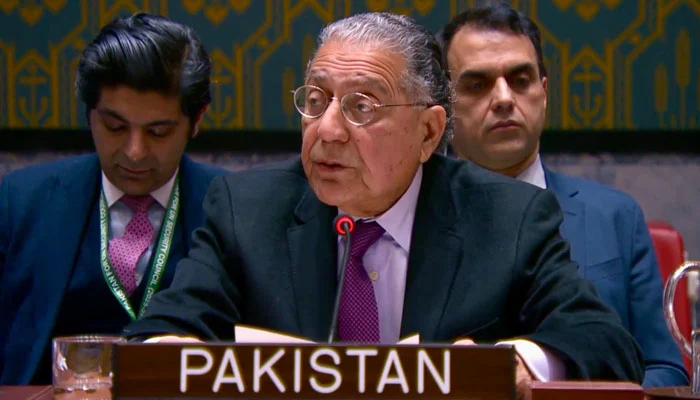Pakistan fighting Daesh, TTP and Majeed Brigade: Munir Akram. He terms Afghanistan "main hub for Daesh recruitment, facilitation". Ambassador calls for subsidiary body to address anti-terror goals.
UNITED NATIONS: Pakistan’s Permanent Representative to the United Nations, Ambassador Munir Akram has called for the need to address and take action against the threat posed by terrorist safe havens existing in neighbouring Afghanistan.
“This threat of Daesh, Tehreek-e-Taliban Pakistan (TTP) and Majeed Brigade is a threat not only to Afghanistan and Pakistan but to the entire region and beyond [….] We must sincerely address the terrorist threats from Afghanistan,” Ambassador Akram said while speaking during a UNSC debate on the 20th biannual report of the secretary-general on the threat posed by Da’esh to international peace and security.
The envoy’s remarks come against the backdrop of increased terrorist attacks in Pakistan ever since the Afghan Taliban’s return to Kabul in Afghanistan.
With Islamabad time again urging Kabul to prevent its territory being used by various terrorist groups against Pakistan, the country witnessed a sharp increase in terror attacks in January 2025, surging by 42% compared to the previous month, according to data released by the Pakistan Institute for Conflict and Security Studies (PICSS), a think tank.
The data revealed that at least 74 militant attacks were recorded nationwide, resulting in 91 fatalities, including 35 security personnel, 20 civilians, and 36 militants. Another 117 individuals sustained injuries, including 53 security forces personnel, 54 civilians, and 10 militants.
KP remained the worst-affected province, followed by Balochistan. In Khyber Pakhtunkhwa’s settled districts, militants carried out 27 attacks, resulting in 19 fatalities, including 11 security personnel, six civilians, and two militants.
The tribal districts of KP (erstwhile Fata) witnessed 19 attacks, leading to 46 deaths, including 13 security personnel, eight civilians, and 25 militants.
Balochistan also experienced a surge in militant activity, with at least 24 attacks, which claimed 26 lives, including 11 security personnel, six civilians, and nine militants.
Elaborating on the situation in Afghanistan, envoy Akram pointed out that D’aesh was suppressed in other countries, but the franchises have also emerged in Afghanistan.
Noting that there were over two dozen terrorist groups operating inside Afghanistan, which was also the “main hub for Daesh recruitment and facilitation”, he said that the country is the main hub of recruitment of Daesh.
“We reject any imputation that there is any such recruitment in Pakistan.”
The international community must address the terrorist threat together through a comprehensive, coordinated and principled strategy based upon the Global Counter-Terrorism Strategy (GCTS) adopted by the UNGA, the ambassador said.
“We are fighting Daesh, we are fighting the TTP and we are fighting the Majeed Brigade and we will continue to do so with determination,” he remarked while maintaining that those responsible for the situation must take these assessments into account and the scale of the threat posed by these terrorist groups and their affiliates, which are well documented.
Called for the establishment of a subsidiary body to “promote the universal consideration and balanced implementation of all four pillars of the GCTS with the vital support of UNOCT as its executing arm”.
He also underscored the need for changes in the UN’s counter-terrorism architecture and sanctions regimes to ensure that they are adequately equipped to respond to the current challenges and represent a fair, just and comprehensive mechanism.
“We must address the new cyber tools of terrorism, including the dark web and cryptocurrencies which are being utilised increasingly for radicalisation campaigns, incitement to violence, terror financing, propaganda and disinformation through the social media,”
“To comprehensively defeat terrorism,” he added, “we must address the new and emerging forms of terrorism, including violent acts by white supremacists, far-right extremists, violent nationalist, fascist, xenophobic, Islamophobic and anti-Muslim groups, and similar ideologies in various parts of the world”.

